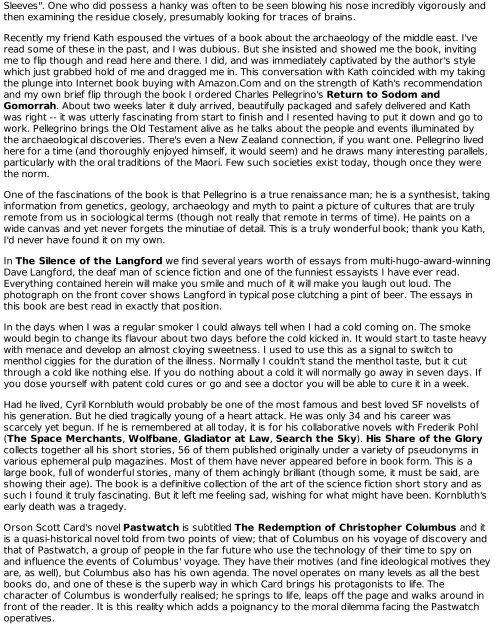Triffids Beard 2 - The Bearded Triffid
Triffids Beard 2 - The Bearded Triffid
Triffids Beard 2 - The Bearded Triffid
You also want an ePaper? Increase the reach of your titles
YUMPU automatically turns print PDFs into web optimized ePapers that Google loves.
Sleeves". One who did possess a hanky was often to be seen blowing his nose incredibly vigorously and<br />
then examining the residue closely, presumably looking for traces of brains.<br />
Recently my friend Kath espoused the virtues of a book about the archaeology of the middle east. I've<br />
read some of these in the past, and I was dubious. But she insisted and showed me the book, inviting<br />
me to flip though and read here and there. I did, and was immediately captivated by the author's style<br />
which just grabbed hold of me and dragged me in. This conversation with Kath coincided with my taking<br />
the plunge into Internet book buying with Amazon.Com and on the strength of Kath's recommendation<br />
and my own brief flip through the book I ordered Charles Pellegrino's Return to Sodom and<br />
Gomorrah. About two weeks later it duly arrived, beautifully packaged and safely delivered and Kath<br />
was right -- it was utterly fascinating from start to finish and I resented having to put it down and go to<br />
work. Pellegrino brings the Old Testament alive as he talks about the people and events illuminated by<br />
the archaeological discoveries. <strong>The</strong>re's even a New Zealand connection, if you want one. Pellegrino lived<br />
here for a time (and thoroughly enjoyed himself, it would seem) and he draws many interesting parallels,<br />
particularly with the oral traditions of the Maori. Few such societies exist today, though once they were<br />
the norm.<br />
One of the fascinations of the book is that Pellegrino is a true renaissance man; he is a synthesist, taking<br />
information from genetics, geology, archaeology and myth to paint a picture of cultures that are truly<br />
remote from us in sociological terms (though not really that remote in terms of time). He paints on a<br />
wide canvas and yet never forgets the minutiae of detail. This is a truly wonderful book; thank you Kath,<br />
I'd never have found it on my own.<br />
In <strong>The</strong> Silence of the Langford we find several years worth of essays from multi-hugo-award-winning<br />
Dave Langford, the deaf man of science fiction and one of the funniest essayists I have ever read.<br />
Everything contained herein will make you smile and much of it will make you laugh out loud. <strong>The</strong><br />
photograph on the front cover shows Langford in typical pose clutching a pint of beer. <strong>The</strong> essays in<br />
this book are best read in exactly that position.<br />
In the days when I was a regular smoker I could always tell when I had a cold coming on. <strong>The</strong> smoke<br />
would begin to change its flavour about two days before the cold kicked in. It would start to taste heavy<br />
with menace and develop an almost cloying sweetness. I used to use this as a signal to switch to<br />
menthol ciggies for the duration of the illness. Normally I couldn't stand the menthol taste, but it cut<br />
through a cold like nothing else. If you do nothing about a cold it will normally go away in seven days. If<br />
you dose yourself with patent cold cures or go and see a doctor you will be able to cure it in a week.<br />
Had he lived, Cyril Kornbluth would probably be one of the most famous and best loved SF novelists of<br />
his generation. But he died tragically young of a heart attack. He was only 34 and his career was<br />
scarcely yet begun. If he is remembered at all today, it is for his collaborative novels with Frederik Pohl<br />
(<strong>The</strong> Space Merchants, Wolfbane, Gladiator at Law, Search the Sky). His Share of the Glory<br />
collects together all his short stories, 56 of them published originally under a variety of pseudonyms in<br />
various ephemeral pulp magazines. Most of them have never appeared before in book form. This is a<br />
large book, full of wonderful stories, many of them achingly brilliant (though some, it must be said, are<br />
showing their age). <strong>The</strong> book is a definitive collection of the art of the science fiction short story and as<br />
such I found it truly fascinating. But it left me feeling sad, wishing for what might have been. Kornbluth's<br />
early death was a tragedy.<br />
Orson Scott Card's novel Pastwatch is subtitled <strong>The</strong> Redemption of Christopher Columbus and it<br />
is a quasi-historical novel told from two points of view; that of Columbus on his voyage of discovery and<br />
that of Pastwatch, a group of people in the far future who use the technology of their time to spy on<br />
and influence the events of Columbus' voyage. <strong>The</strong>y have their motives (and fine ideological motives they<br />
are, as well), but Columbus also has his own agenda. <strong>The</strong> novel operates on many levels as all the best<br />
books do, and one of these is the superb way in which Card brings his protagonists to life. <strong>The</strong><br />
character of Columbus is wonderfully realised; he springs to life, leaps off the page and walks around in<br />
front of the reader. It is this reality which adds a poignancy to the moral dilemma facing the Pastwatch<br />
operatives.


